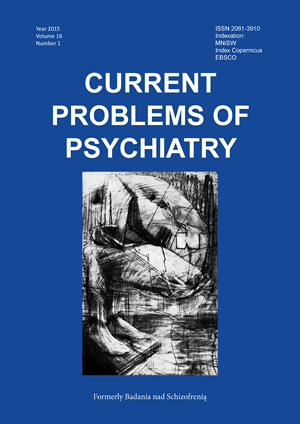Charakterystyka i ewaluacja warsztatu radzenia sobie ze stresem przeznaczonego dla osób chorych na łuszczycę
Słowa kluczowe:
warsztat zarządzania stresem, radzenie sobie ze stresem, psychodermatologia, łuszczycaAbstrakt
Łuszczyca jest zaliczana do chorób psychosomatycznych. Wiąże się z szerokim spectrum problemów natury psychologicznej, takich jak, m.in., odczuwanie wysokiego poziomu stresu, obniżone poczucia własnej wartości, zniekształcony poznawczy obraz własnego ciała czy z zaburzeniami afektywnymi (jak lęk społeczny i depresja). Z drugiej strony, zmiany chorobowe są wyzwalane i nasilane poprzez wiele różnorodnych czynników, w tym stres psychologiczny. I właśnie z tego powodu we współczesnej psychodermatologii podkreśla się konieczność holistycznego traktowania osób z chorobami skóry.
Cel: Celem artykułu jest przedstawienie warsztatu zarządzania stresem przeznaczonego dla osób z łuszczycą oraz jego ewaluacja.
Materiał i metody: W warsztacie uczestniczyły 62 osoby ze zdiagnozowaną łuszczycą zwykłą. Warsztaty odbywały się w 4 miastach w Polsce. Do oceny nasilenia stresu wykorzystano kwestionariusz PSS-10 i metodę skalowania. Dodatkowo użyto ankiety własnej konstrukcji.
Wyniki: W trakcie warsztatów poziom stresu uczestników stopniowo zmniejszał się. Chorzy zgłaszali, m.in., potrzebę uczestniczenia w większej liczbie oddziaływań psychologicznych oraz potrzebę zintensyfikowanego kontaktu z lekarzem dermatologiem, który mógłby udzielić informacji na temat ich choroby i pielęgnacji skóry.
Wnioski: Uczestniczenie w psychologicznych warsztatach oraz zintensyfikowanie kontaktów z lekarzami może mieć istotne znaczenie dla zdrowia psychicznego osób chorych na łuszczycę.
Bibliografia
1. Pastuszka M, Tyc-Zdrojewska E, Uczniak S, et al. Current concepts of aetiopathogenesis of psoriasis [Polish]. Post Dermatol Alergol 2011; 26 (Suppl. 3): 117-31.
2. Papadopoulos L., Bor R. Psychological Approaches to Dermatology,The British Psychological Society, London, 1999
3. Mazzotti E, Mastroeni S, Lindau J, et al. Psychological distress and coping strategies in patients attending a dermatology outpatient clinic. J Eur Acad Dermatol Venereol 2012; 26: 746-54.
4. Steuden S, Janowski K. Psychodermatological diseases [Polish]. Przegl Dermatol 2002; 89: 175-83.
5. Zalewska-Janowska A. Psychodermatology in allergology [Polish]. Alergia Astma Immunologia 2010; 15: 109-17.
6. Basińska M., Drozdowska M, Type A behavior in individuals with psoriasis as a determinant of acceptance of illness. Post Dermatol Alergol 2012, 6: 432-439.
7. Ingram JT. The significance and management of psoriasis. BMJ 1954; 24: 823-8.
8. Susskind M, McGuire RJ. The emotional factor in psoriasis. Scottish Medical J 1959; 4: 503-7.
9. Rieder E, Tausk F. Psoriasis, a model of dermatologic psychosomatic disease: psychiatric implications and treatments. Int J Dermatol 2012; 51: 12-26.
10. Palijan TZ, Kovacević D, Koić E, et al. The impact of psoriasis on the quality of life and psychological characteristics of persons suffering from psoriasis. Coll Antropol 2011; 35 (Suppl. 2): 81-5.
11. Sampogna F, Tabolli S, Abeni D. Living with psoriasis: prevalence of shame, anger, worry, and problems in daily activities and social life. Acta Derm Venerol 2012; 92: 299-303.
12. Kurd SK, Troxel AB, Crits-Christoph P, Gelfand JM. The risk of depression, anxiety, and suicidality in patients with psoriasis: a population-based cohort study. Arch Dermatol 2010; 146: 891-5.
13. Ograczyk A, Malec J, Miniszewska J, et al. Psychological aspects of atopic dermatitis and contact dermatitis: stress coping strategies and stigmatization. Post Dermatol Alergol 2012; 1: 14-8.
14. Zalewska A, Miniszewska J, Woźniacka A, et al. Disease coping and quality of life in psoriasis vulgaris patients [Polish]. Przegl Dermatol 2003; 90: 267-72.
15. Zalewska A, Miniszewska J, Chodkiewicz J, et. al. Acceptance of chronic illness in psoriasis vulgaris patients. JEADV 2007; 21: 235- 242.
16. De Korte J, Sprangers MAG, Mombers FMC, et al. Quality of life in patients with psoriasis: A systematic Literature Review. J Invest Dermatol, Symposium Proceedings 2004; 2: 140-7.
17. Miniszewska J., Chodkiewicz J., Ograczyk A., Zalewska-Janowska A. Optimism as a predictor of health-related quality of life in psoriatics. Post Dermatol Alergol 2012, 2, 91-95.
18. Fortune D.G., Richards H.L., Kirby B., Bowcock S., Main C.J., Griffits C.E. M. (2002). A cognitive-behavioral symptom management programme as an adjunct in psoriasis therapy. BJ Dermatol, 146, 458-465.
19. Fortune D.G., Richards H.L., Griffits C.E.M., Main C.J. (2004). Targeting cognitive-behavior therapy to patients implicit model of psoriasis: Results from a patient preference controlled trial. BJ Dermatol, 43, 65-82.
20. Steuden S., Janowski K. Psychodermatological diseases. Przegl Derm,2002, 89, 175-183.
21. Chodkiewicz J, Miniszewska J. The present application and the progress of cognitive-behavioral Therapy [Polish]. Psychiatr Pol 2006; 2: 279-90.
22. Beck J. Cognitive Therap:y Basics and Beyond [Polish], UJ, Kraków, 2005.
23. Juczyński, Ogińska-Bulik, Tools for measuring stress and coping with it, [Polish], PTP, Warszawa 2008
24. Popiel A, Pragłowska E. Cognitive-behavioral therapy. Theory and practices [Polish]. Paradygmat, Warszawa, 2008
25. Heszen I, Sęk H. Health Psychology [Polish] PWN, Warszawa 2007.


